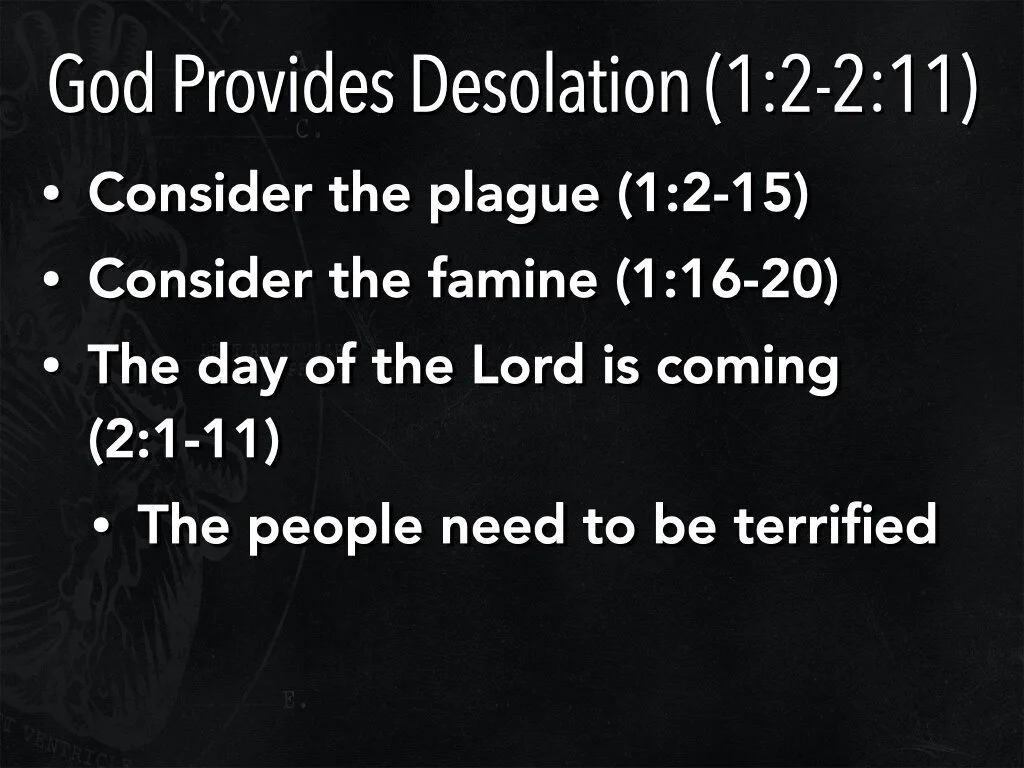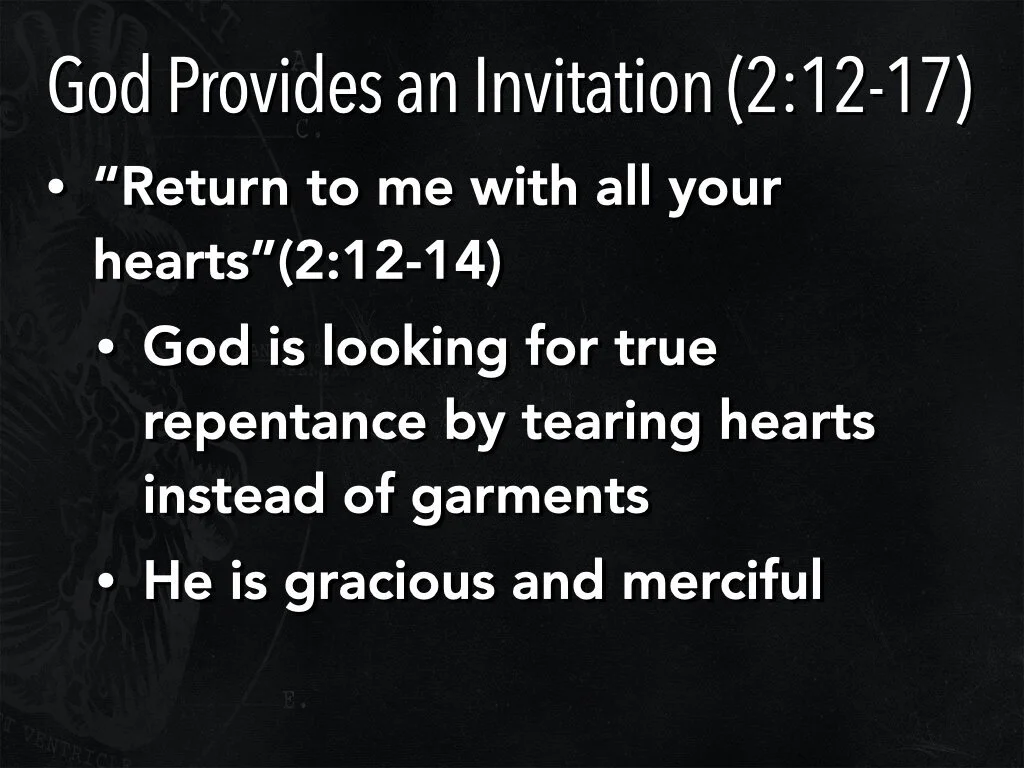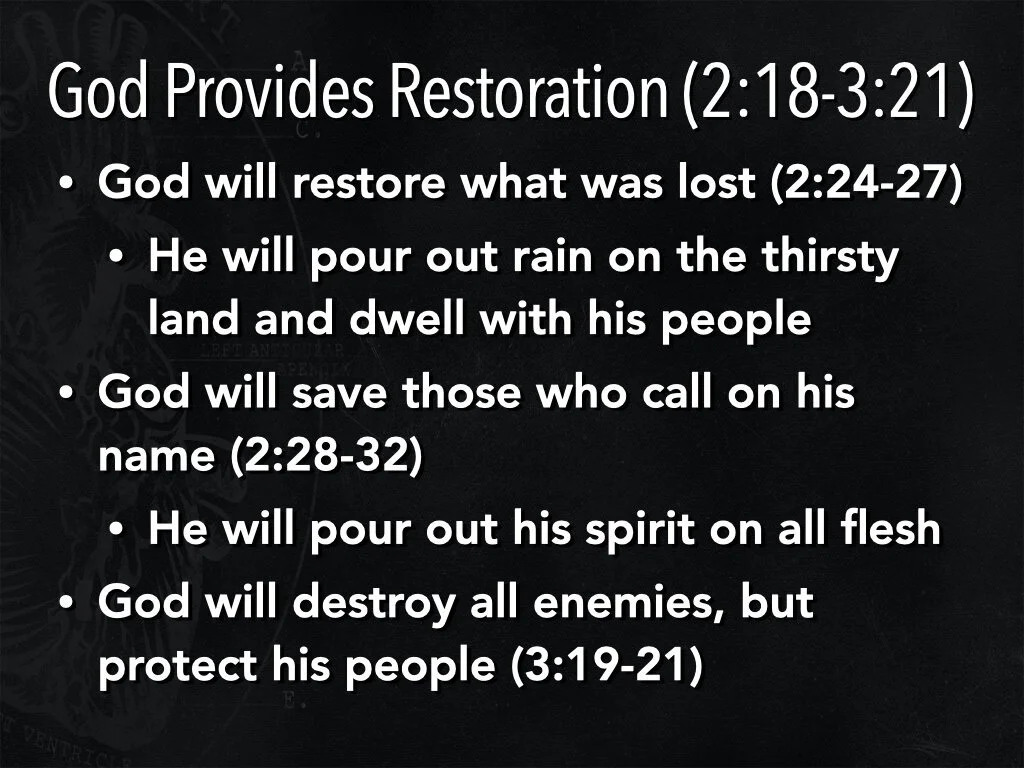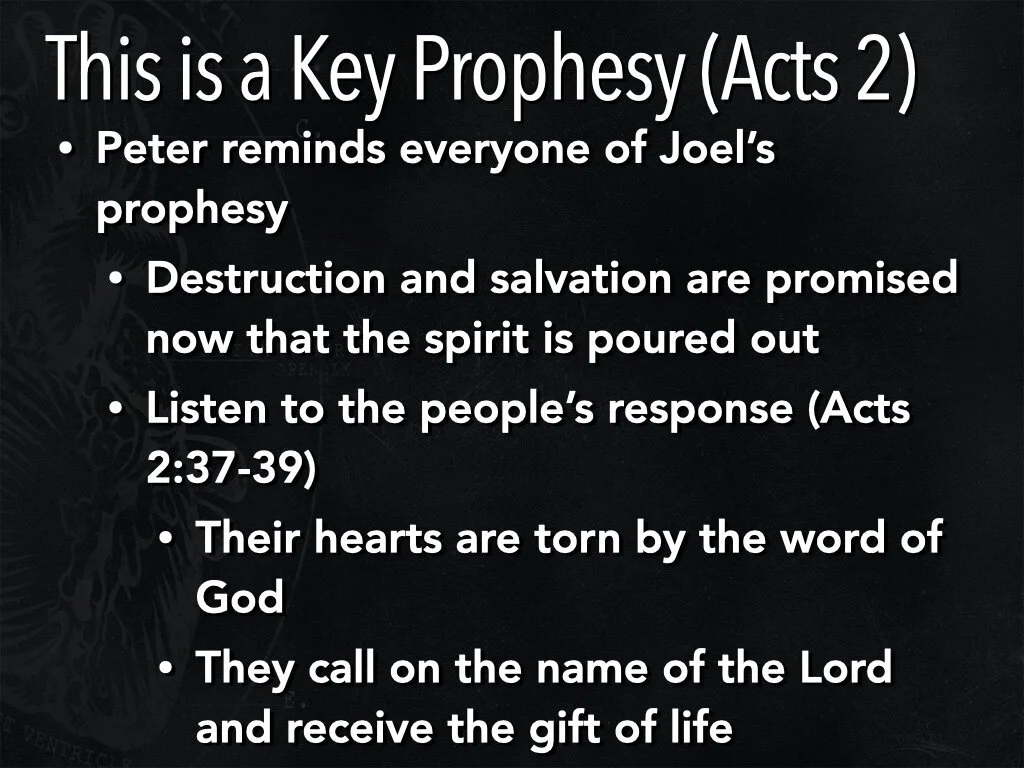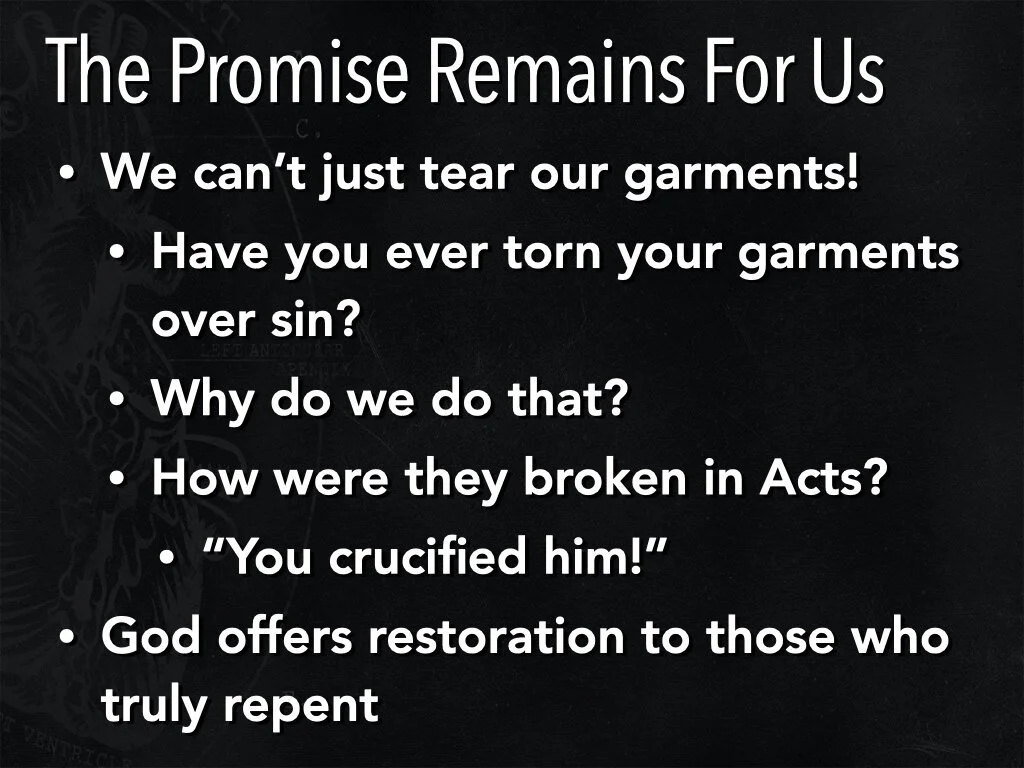Tear Your Hearts (Joel)
We are going to be looking at the book of Joel. The outline of the book is very simple to follow. He begins by talking about the desolation of God's people for their sins. Then, he talks about God's plea for the people to repent. Finally, he discusses the restoration that God promises to bring after they repent. So we can think of it like this: Desolation (1:2-2:11), Invitation (2:12-17), and Restoration (2:18-3:21). That's an easy way to remember the book of Joel.
Desolation (1:1-2:11)
Consider the Plague and Famine
There has been a horrible plague in the land of Israel. Locusts have swept through and eaten up the crops. When they are done passing through, there is not a hint of vegetation left. They are eating every vine and every leaf to the point where the land is like a wasteland. Locust swarms can reach over 65 billion insects. Joel is saying, "Consider, has such a thing happened in your days or the days of your fathers?" Think about this event and wake up you drunkards, lament like a virgin who loses her bridegroom, be ashamed, wail, put on sackcloth and ashes, consecrate a fast, and cry out to the Lord!
Why would Joel want them to do that? Catastrophes happen all the time. Why should they consider this catastrophe and show remorse toward God? Why should they tell their children, and why should their children tell their children? For Israel, this is not just another catastrophe. This is the cursing God has promised to give his covenant people when they sin. Joel is prophesying in Judah and telling them that God has delivered this plague, as he promised he would in Deuteronomy 28, and it is devastating! This cursing is supposed to wake the people up. Then, in verses 16-20, we find out that God has brought not only a plague but also drought and famine. These are dire times in Judah. The people need to cry out to the Lord and show that they are repenting, so God will relent. But there is something even more important that they need to think about.
The Day of the Lord is Coming
In the first eleven verses of Chapter 2, Joel uses this event of a locust swarm to illustrate what God has in store for the final judgment of Israel.
Here Joel transitions from looking at what has happened to talk about how much worse the future judgment will be. Like the locust army, God's army will sweep through and devour everything. The garden of Eden will be turned into a desolate wilderness. This section is one of the most horrific writings in scriptures as God's army comes in complete discipline and unstoppable force. They are thorough and able to move in an inhuman way. They run like horses over mountains, each of them maintaining their line perfectly. They don't run into each other at all. They scale walls, burst through doors, and climb into windows. Verse 11 says that God can control this force, and no one can endure the judgment on that day. Joel wants his people to recognize that there is no hope of survival in this judgment. This won't be like the Babylonians. The enemies of God are going to be wiped out completely. But there is hope as we continue reading.
Invitation (2:12-17)
God Says, "Return To Me.” In Chapter 2:12-17, Joel goes from talking about the need for repentance to God's desire to forgive the sins of his people if they genuinely repent.
Joel 2:12--14 (ESV) --- 12 "Yet even now," declares the Lord, "return to me with all your heart, with fasting, with weeping, and with mourning; 13 and rend your hearts and not your garments." Return to the Lord your God, for he is gracious and merciful, slow to anger, and abounding in steadfast love; and he relents over disaster. 14 Who knows whether he will not turn and relent, and leave a blessing behind him, a grain offering and a drink offering for the Lord your God?
Joel says that even now, God is looking for those who will return to him with "all your heart." Here we find the true meaning of repentance. Joel never really specifies the people's sin, but he tells them to turn away from sin and turn toward God with our hearts. Notice that he lists outward showings of remorse with fasting, wailing, and mourning. But then he says to tear your heart open to God. Notice how he says that they need to "rend your hearts and not your garments." In that culture, rending, or tearing, your garments was a standard outward showing of grief and anguish. God is saying that he doesn't care about the outward show. He wants them to let the knowledge of their sins tear them up inside! He wants to see them experience real remorse over their sins.
Then in verse 13, he turns to the discussion to God's character as it was shown to Moses on the mountain, "He is gracious and merciful, slow to anger, and abounding in steadfast love; and he relents over disaster. Who knows whether he will not turn and relent, and leave a blessing behind him, a grain offering and a drink offering for the Lord your God." This is who God is and what God wants to do. He wants to show mercy and give a blessing to his people if they repent.
Restoration (2:12-3:21)
God Provides Restoration For His People
The final section of this book (2:18-3:21) discusses God's intention to restore those who will turn to him. In this section, we see that God has an earnest desire to bless his people abundantly. He wants to turn things around and pour out rain on a thirsty land. Look at the result in verses 24-27
Joel 2:24--27 (ESV) --- 24 "The threshing floors shall be full of grain; the vats shall overflow with wine and oil. 25 I will restore to you the years that the swarming locust has eaten, the hopper, the destroyer, and the cutter, my great army, which I sent among you. 26 "You shall eat in plenty and be satisfied, and praise the name of the Lord your God, who has dealt wondrously with you. And my people shall never again be put to shame. 27 You shall know that I am in the midst of Israel, and that I am the Lord your God and there is none else. And my people shall never again be put to shame.
In this section, God reveals that he plans to repay the people with all of the blessings they missed. This is going to create an overflow of grain and wine that will make them fully satisfied. Did you catch the ultimate blessing of verse 27? Now God has a relationship where countless blessings are flowing, and he is "in the midst of Israel." What a great picture!
Pouring Out God's Spirit
These blessings of physical satisfaction from pouring out rain is paralleled with a final reality of God pouring out his Spirit on all flesh. God is planning to bring a blessing that is every bit as great as the judgment in 2:1-11 is horrifying.
Joel 2:28--32 (ESV) --- 28 "And it shall come to pass afterward, that I will pour out my Spirit on all flesh; your sons and your daughters shall prophesy, your old men shall dream dreams, and your young men shall see visions. 29 Even on the male and female servants in those days I will pour out my Spirit. 30 "And I will show wonders in the heavens and on the earth, blood and fire and columns of smoke. 31 The sun shall be turned to darkness, and the moon to blood, before the great and awesome day of the Lord comes. 32 And it shall come to pass that everyone who calls on the name of the Lord shall be saved. For in Mount Zion and Jerusalem, there shall be those who escape, as the Lord has said, and among the survivors shall be those whom the Lord calls.
What in the world does this mean? How will God pour out his spirit? How does one pour out their spirit? We see that all who call on the name of the Lord will be saved from the judgment as God pours out his Spirit. Like God poured out rain to meet their immediate physical needs, he promises to provide for their spiritual need of restoration amid this coming judgment.
Salvation But Still Judgment
Notice how the judgment is still coming. Not all will be saved. Only those who call on the name of the Lord. In Chapter 3, Joel again brings up how God's army will come in to wipe mankind out, but this time he includes the phrase in verse 16, "But the Lord is a refuge to his people, a stronghold to the people of Israel." Notice how the book ends in verses 18-21 to close the book.
Joel 3:19--21 (ESV) --- 19 "Egypt shall become a desolation and Edom a desolate wilderness, for the violence done to the people of Judah, because they have shed innocent blood in their land. 20 But Judah shall be inhabited forever, and Jerusalem to all generations. 21 I will avenge their blood, blood I have not avenged, for the Lord dwells in Zion."
What's The Message?
In the end, God will destroy the enemies of his people and give his people eternal security after they accept his invitation by rending their hearts and calling on his name. This is what the prophet Joel is about. Joel is a Key Prophesy in Scripture
Having learned what this book is about, is it any surprise that God would have Peter discuss Joel on the day of Pentecost? The people at that time are living in a state of spiritual desolation. They have seen a flash of hope with John, the baptizer, and Jesus. But now those two are gone, and Jesus is gone because they killed him!. So, Peter stands up and says that these miraculous signs the 12 have performed are proof that God has poured out his Spirit as was prophesied in Joel (3:16-21). Jesus has been given all power and has poured out the blessing that Joel spoke of, and you have crucified him! Notice how people respond in verse 37.
Acts 2:37--39 (ESV) --- 37 Now when they heard this they were cut to the heart, and said to Peter and the rest of the apostles, "Brothers, what shall we do?" 38 And Peter said to them, "Repent and be baptized every one of you in the name of Jesus Christ for the forgiveness of your sins, and you will receive the gift of the Holy Spirit. 39 For the promise is for you and for your children and for all who are far off, everyone whom the Lord our God calls to himself."
These people were "cut to the heart." Their hearts were torn when they learned that they had murdered the Messiah. This is what God wanted all along as Joel prophesied, "Rend your hearts and not your garments." It became evident to them that they were in the wrong and needed to repent to be saved from the horrific judgment of Joel's prophesy. If Jesus is on the throne, we want to be on his side! So God shows his mercy by allowing these people to call on his name, as Joel had said. They did this by repenting of their sins and be baptized for the forgiveness of their sins.
Application
The Promise Remains For Us If We Return to God
Do we realize that this prophecy was written for us as well? In Hebrews 10:26-31, we find a terrifying description of the judgment that is to come for those who go on sinning and rebelling against God after he has been so merciful. What can we do to prepare?
We Can't Just Rend Our Garments
We can't just leave this place and go back to our usual way of selfish thinking. But what will be our tendency? Like Israel, we tend to rend our garments for God. We say, "God I really hate that I've done that to you. I'm an awful person and I want to change." Then we jump at the next opportunity to sin. It's not real! It's not enough to act like we are repenting. We must actually change. The usual way of thinking is what made us live for sin! Our hearts have to be tender enough to let our sin tear us up inside! As a result, we have to be renewed in the spirit of our minds to love God more than our sins, more than our families, and more than ourselves. We must deny ourselves and fall before God to find satisfaction in our souls.
Conclusion - Return to the Lord and Call On His Name
We are told in Acts we must call on the name of the Lord by submitting to baptism. When we are going under the waters of baptism, we are crying out to God, asking him to cut off our sins and apply the blood of Christ that can atone for all sin. We do this with a confession that we are sinners who need God's help, and with faith in what Joel told us about God, that he is "gracious and merciful, slow to anger, and abounding in steadfast love."
The message of Joel is similar to the overall message of the Bible. We have sinned and are worthy of curses. God must provide justice, but he loves us enough to forgive us and bless us if we turn to him in faithful obedience. The choice is ours. Will we rend our hearts, or will we rebel?




